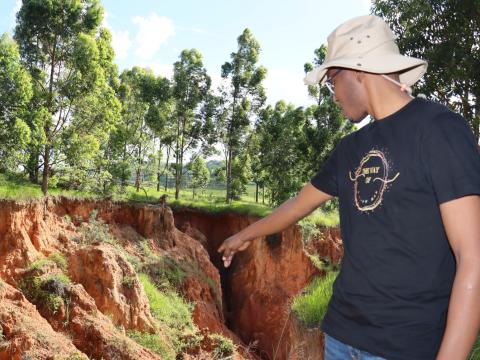Life Restored At Ntuja Community Through Farmer Managed Natural Regeneration Interventions

What started as small gullies was becoming not just an environmental problem, but also endangering the lives of Ntuja community residents, under Ekukhanyeni Area Programme.
From being incapable of grazing their cows, to always living in fear that the children could wander around and fall into the gullies, this community faced severe impacts from the gully erosion.
Mzwandile, former Bucopho of Ntuja, explains how their lives were affected; “We couldn’t even construct our homes by these beautiful lands because we feared they might collapse into the gullies. Farmers were frustrated because not only could they not graze their livestock there, they could also collapse into the gullies as well”, he said.
World Vision Eswatini intervened, through its Farmer Managed Natural Regeneration (FMNR) under its Livelihoods technical programme. FMNR is a low-cost land restoration technique used to combat poverty and hunger amongst poor farmers by increasing food and timber production and resilience to climate extremes. It also involves the systematic regrowth and management of trees and shrubs from felled tree stumps, sprouting root systems.
To stabilize the gullies, World Vision supported them with fencing material (10X 1.8mby1m rolls for each gully, fence wood) and about 500 fruit trees which were planted by the community members. For the first gully, the organization further urged the government to support the community with over 1,000 eucalyptus trees in 2012.
They see the change;
“The gullies have stopped spreading; the trees have really prevented from doing so. The fencing ensures that no livestock wanders into these areas. Our children are safe too”, Mzwandile added.
It’s not just a tree, it’s hope